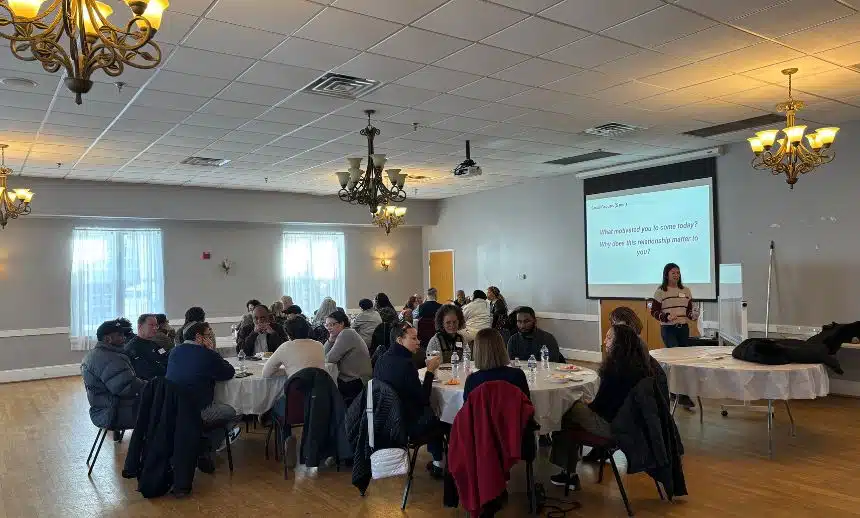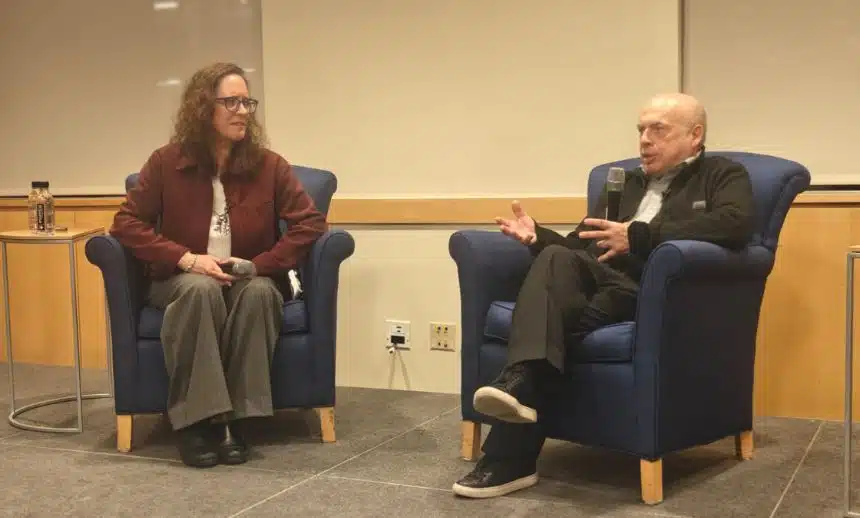
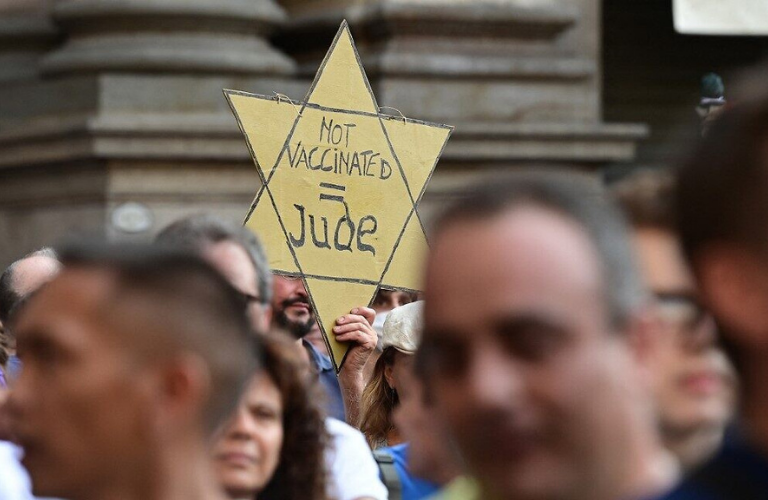
The CAM Guide to Identifying Holocaust Trivialization
While Holocaust trivialization is not a new phenomenon, its worldwide surge during the ongoing Covid-19 pandemic has underscored the urgency to address and combat it effectively.
The rising trend, which crisscrosses the ideological spectrum, has been mainly fueled by rancorous public discourse over health measures enacted by governments to combat the pandemic over the past two years.
However, it is also manifested in other forms, particularly in slanderous rhetoric employed by anti-Israel activists to distort the history of the Holocaust by falsely comparing it to the Jewish state’s treatment of the Palestinians today.
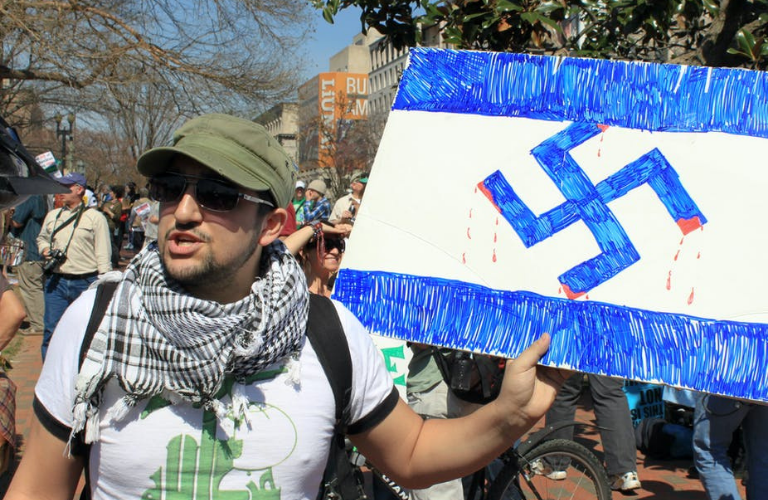
So what is Holocaust trivialization exactly and how can it be identified? In essence, it is the misappropriation of imagery, symbols, language, and historical facts related to the Holocaust — the systematic persecution and industrial-scale extermination of the Jewish people by Nazi Germany and its allies during World War II — in discussions on unrelated issues that are inherently incomparable to the unique horrors inflicted on Jews by the Nazis.
This purposeful obfuscation of the distinctive nature and scope of the Holocaust desecrates the memory of the victims of the Nazis and belittles the dignity of survivors still alive today. It also serves as a gateway to outright Holocaust denial, and creates fertile ground for contemporary antisemites who seek to downplay the transgressions of the Nazis to promote their own nefarious aims.
Not everything one disagrees with is the Holocaust, and no issue in the modern world, regardless of how controversial it is, even remotely justifies comparisons to the ruthless discrimination and mass genocide perpetrated by the Nazis against the Jews in the 1930s and 1940s, the worst crime in human history.
The International Holocaust Remembrance Alliance’s 2013 Working Definition of Holocaust Denial and Distortion delineates several forms of behavior that constitute Holocaust trivialization, including:
“Intentional efforts to excuse or minimize the impact of the Holocaust or its principal elements, including collaborators and allies of Nazi Germany”;
“Accusing Jews of ‘using’ the Holocaust for some manner of gain”;
“Use of the term Holocaust’ to reference events or concepts that are not related in any meaningful way to the genocide of European and North African Jewry by Nazi Germany and its accomplices between 1941 and 1945”;
“Trivializing or honoring the historical legacies of persons or organizations that were complicit in the crimes of the Holocaust”;
and, perhaps with most relevance to the Covid-19 situation, “The use of imagery and language associated with the Holocaust for political, ideological, or commercial purposes unrelated to this history in online and offline forums.”
The most prevalent example of Holocaust trivialization from recent times is the display of the “Judenstern,” or yellow Star of David, the Nazis forced Jews to wear as identifying marks. Critics of Covid-19 pandemic-related health measures often use the “Judenstern” as a prop to portray themselves as victims like the Jews in Nazi Germany, with yellow Stars of David appearing at many demonstrations across the globe and countless social media posts since the outbreak of the pandemic in 2020.
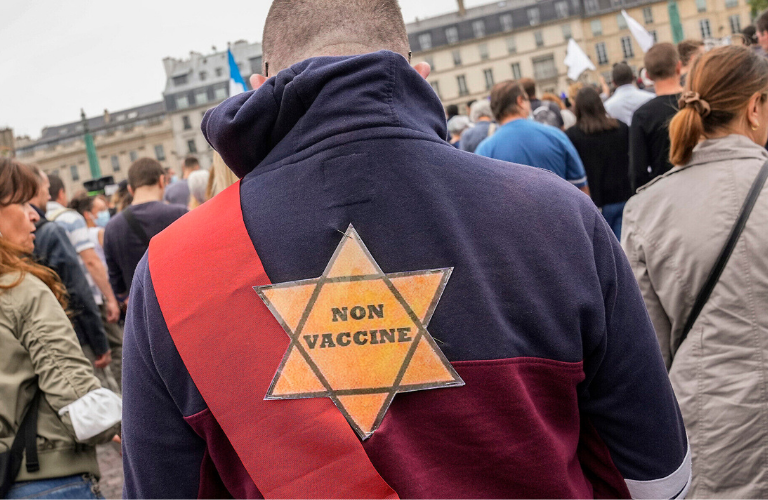
Mock concentration camp uniforms are also used in a similar manner, such as by an anti-vaccine activist who marched around a main intersection in Melbourne, Australia, in striped pajamas carrying a sign reading, “History repeats.”
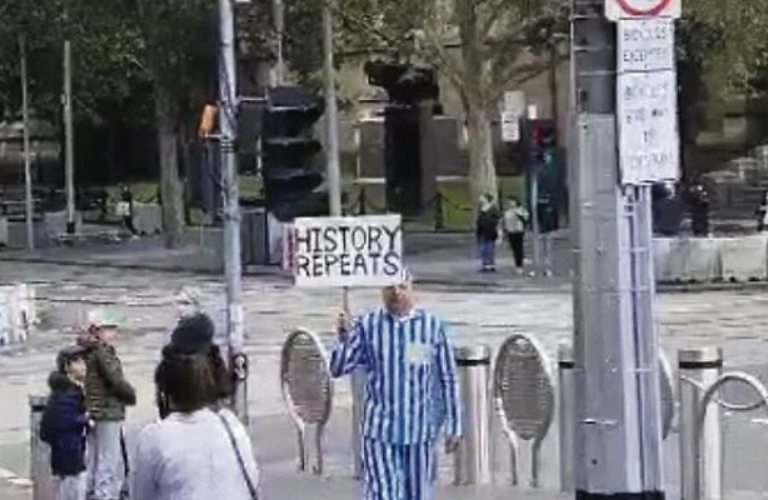
Meanwhile, city council and school board meetings across the United States have seen participants perform Nazi salutes during debates on mask mandates.

Infamous phrases, such as “Arbeit macht frei” (or “Work sets you free”) from the Auschwitz death camp gate, are also used to denounce pandemic-related health measures.
Furthermore, current government officials, such as Dr. Anthony Fauci in the United States, are frequently compared to Nazi leaders. For example, in November, Fox Nation host Lara Logan said Fauci “represents Joseph Mengele, the Nazi doctor who did experiments on Jews during the Second World War and in the concentration camps.”
Among anti-Israel activists, Holocaust trivialization has also become increasingly pervasive means of defaming and delegitimizing the Jewish state. During last May’s flare-up of Israel-Gaza violence, social media sites were awash with comparisons of Israel to the Nazis and Gaza to Auschwitz, with variations of the phrase “Hitler was right,” among others, proliferating online.
Holocaust trivialization has seeped into other realms as well, with activists at the 2021 UN Climate Change Conference in Scotland referring to climate change as an “environmental holocaust.” And a disturbing TikTok fad the previous year popularized teenagers pretending to be Holocaust victims.
A database of more than 120 Holocaust trivialization incidents reported in the media since the summer of 2021 can be accessed here.
Action must be taken to stop this intolerable and dangerous trend. This is why CAM launched the #CantBeCompared campaign against the normalization of Holocaust trivialization, urging international, national, and local authorities to treat Holocaust trivialization as hate speech and combat it as such, and imploring major social media networks and other internet companies to include it in their hate-speech policies.
Time and again, history has proven how quickly bigoted words can turn into antisemitic violence. When Jews are threatened, societies as a whole are weakened, with disastrous consequences. To ensure the grim lessons of the past have been learned, good people of conscience of all backgrounds must stand together and uphold the most basic moral principles by firmly condemning and acting against Holocaust trivialization.

